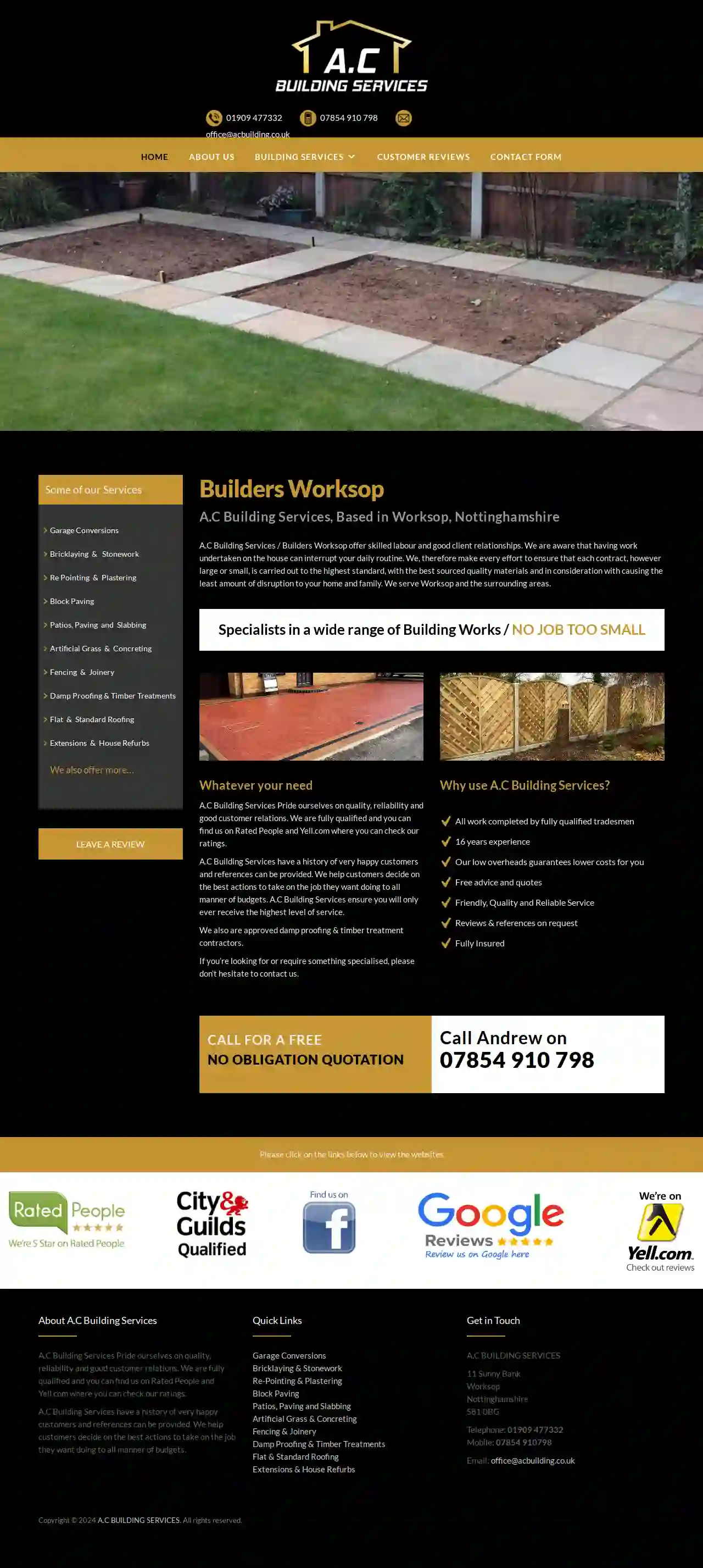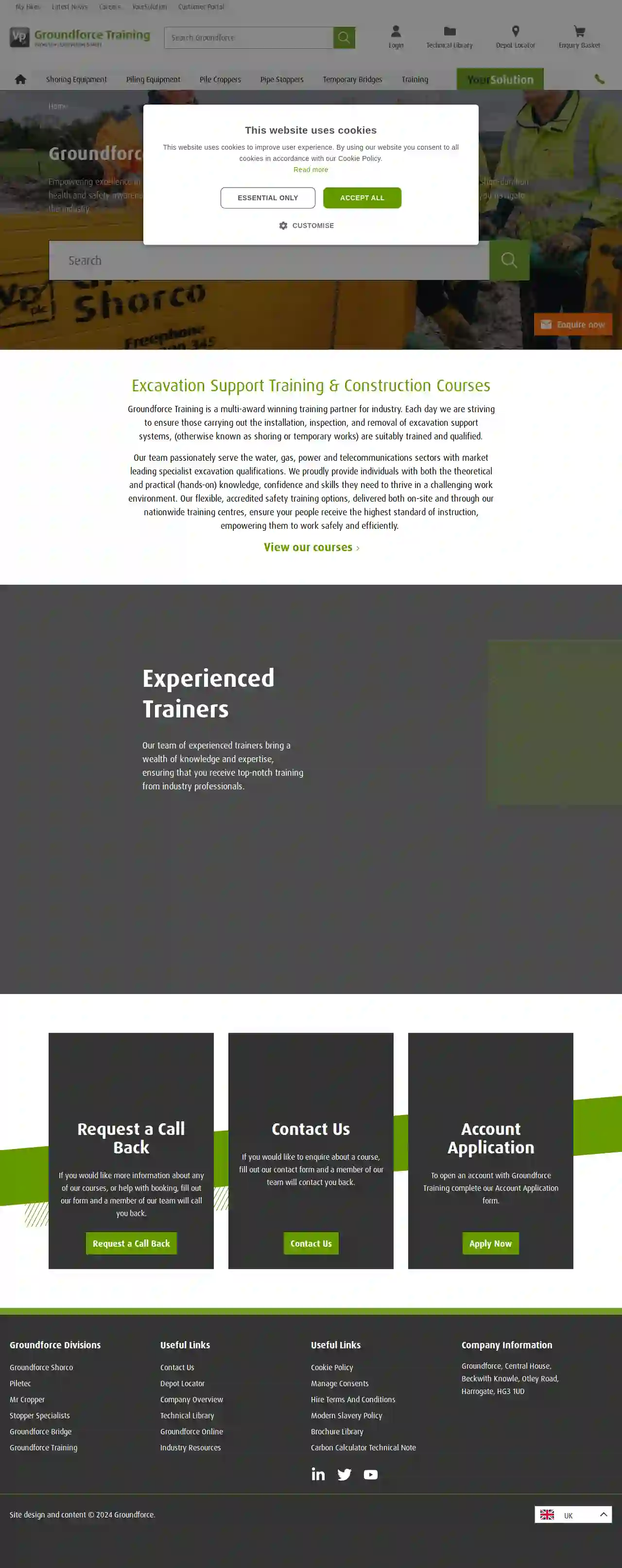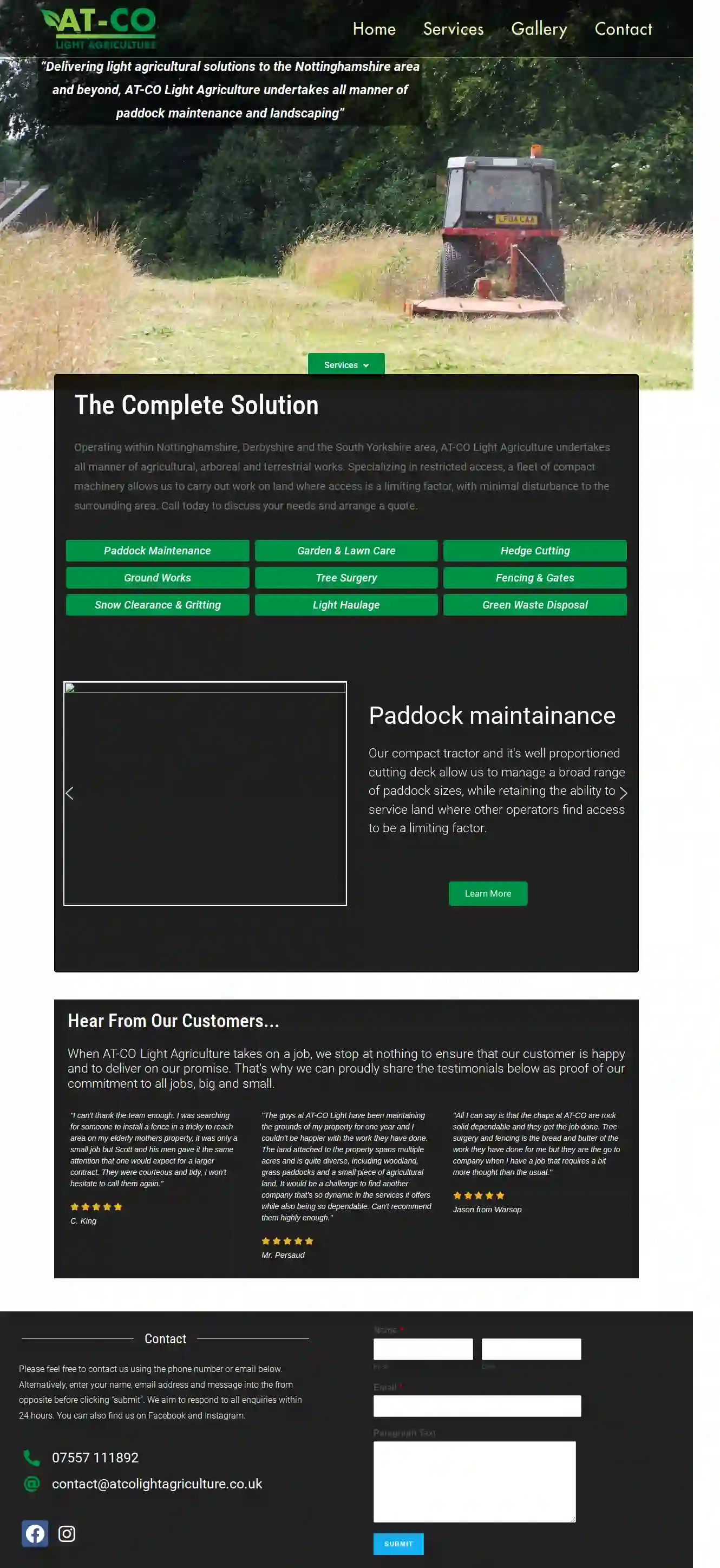Demolition Contractors Worksop
Top Demolition Experts in Worksop
Receive 3 FREE Demolition Companies quotes for your project today! Compare profiles, reviews, accreditations, portfolio, etc... and choose the best service.
- Sa
Sarjant Construction Ltd
55 reviewsWorksop, GB- Services
- Why Us?
Get Quote 
A.C Building Services
520 reviews11 Sunny Bank, Worksop, S81 0BG, GBAbout A.C Building Services A.C Building Services pride ourselves on quality, reliability and good customer relations. We are fully qualified and you can find us on Rated People and Yell.com where you can check our ratings. A.C Building Services have a history of very happy customers and references can be provided. We help customers decide on the best actions to take on the job they want doing to all manner of budgets. We also are approved damp proofing & timber treatment contractors. If you’re looking for or require something specialised, please don’t hesitate to contact us.
- Services
- Why Us?
- Gallery
Get Quote
Groundforce Training Services - Excavation Safety
4.9389 reviewsCentral House, Beckwith Knowle, Otley Road, Harrogate, HG3 1UD, GBGroundforce: Your Partner in Safety and Efficiency Groundforce is a leading provider of shoring, piling, and excavation safety solutions. We offer a wide range of products and services to meet the needs of our customers in the construction, infrastructure, and utilities sectors. Our commitment to safety and efficiency is reflected in everything we do, from the design and manufacture of our products to the training we provide to our customers. Our History Groundforce has been in business for over 50 years, and we have a long history of providing innovative and reliable solutions to our customers. We are constantly investing in research and development to ensure that our products and services are at the forefront of the industry. Our Mission Our mission is to provide our customers with the safest and most efficient solutions possible. We are committed to providing our customers with the highest level of service and support. We believe that our customers are our most valuable asset, and we are dedicated to building long-term relationships with them. Our Team Our team is made up of experienced professionals who are passionate about safety and efficiency. We are committed to providing our customers with the best possible experience. We are always available to answer your questions and provide you with the support you need.
- Services
- Why Us?
- Accreditations
- Gallery
Get Quote- Mi
Mini Skip Hire
1Worksop, GB- Services
- Why Us?
Get Quote - GR
GROUND-TEC
1Worksop, GB- Services
- Why Us?
Get Quote 
AT-CO Light Agriculture
1Worksop, GBDelivering light agricultural solutions to the Nottinghamshire area and beyond, AT-CO Light Agriculture undertakes all manner of paddock maintenance and landscaping. Operating within Nottinghamshire, Derbyshire and the South Yorkshire area, AT-CO Light Agriculture undertakes all manner of agricultural, arboreal and terrestrial works. Specializing in restricted access, a fleet of compact machinery allows us to carry out work on land where access is a limiting factor, with minimal disturbance to the surrounding area. Call today to discuss your needs and arrange a quote.
- Services
- Why Us?
- Testimonials
- Gallery
Get Quote- To
Tour Construction Ltd
54 reviewsWorksop, GB- Services
- Why Us?
Get Quote - Dr
Dropped Kerb Specialists Worksop
1Worksop, GB- Services
- Why Us?
Get Quote - EA
EA Groundworks Ltd
51 reviewsWorksop, GB- Services
- Why Us?
Get Quote - Bl
Blagg Plant Hire
51 reviewsWorksop, GB- Services
- Why Us?
Get Quote
Over 11,537+ Excavation Companies in our network
Our excavation pros operate in Worksop & beyond!
ExcavationHQ has curated and vetted Top Excavation Contractors in and around Worksop. Find a top & reliable business today.
Frequently Asked Questions About Demolition Contractors
- Dust Suppression: Use water spraying, misting systems, or other dust suppression techniques to control airborne particles.
- Noise Barriers: Erect temporary noise barriers around the demolition site to reduce noise transmission to nearby properties.
- Work Schedule: Schedule noisy demolition activities during permitted hours to minimize disturbance to neighbors.
- Communication: Keep neighbors informed about the demolition schedule and any potential disruptions.
- Recycling: Concrete, brick, metal, and wood can be recycled and reused in other construction projects, reducing waste sent to landfills.
- Landfill Disposal: Non-recyclable materials are disposed of in designated landfills according to local regulations.
- Donation: Some materials, such as fixtures or appliances, may be suitable for donation to charitable organizations.
- Waste Generation: Demolition generates a large volume of debris, contributing to landfill space and potentially releasing harmful substances into the environment if not disposed of properly.
- Air Pollution: Dust and particulate matter released during demolition can impact air quality, affecting human health and the environment.
- Noise Pollution: Demolition activities can generate significant noise, disturbing nearby residents and wildlife.
- Resource Depletion: Demolition consumes resources that could be salvaged and reused, contributing to resource depletion and environmental degradation.
What is the difference between demolition and deconstruction?
Demolition: Typically involves bringing down a structure quickly and efficiently, often using heavy machinery and potentially explosives. The primary goal is to clear the site.
Deconstruction: Focuses on carefully dismantling a building piece by piece to salvage reusable materials. It prioritizes minimizing waste and environmental impact, often involving manual labor and specialized tools.
The choice between demolition and deconstruction depends on the project's objectives, budget, and environmental considerations.
How can I minimize the dust and noise from demolition?
What happens to the debris after demolition?
What are the environmental impacts of demolition?
What is the difference between demolition and deconstruction?
Demolition: Typically involves bringing down a structure quickly and efficiently, often using heavy machinery and potentially explosives. The primary goal is to clear the site.
Deconstruction: Focuses on carefully dismantling a building piece by piece to salvage reusable materials. It prioritizes minimizing waste and environmental impact, often involving manual labor and specialized tools.
The choice between demolition and deconstruction depends on the project's objectives, budget, and environmental considerations.
How can I minimize the dust and noise from demolition?
- Dust Suppression: Use water spraying, misting systems, or other dust suppression techniques to control airborne particles.
- Noise Barriers: Erect temporary noise barriers around the demolition site to reduce noise transmission to nearby properties.
- Work Schedule: Schedule noisy demolition activities during permitted hours to minimize disturbance to neighbors.
- Communication: Keep neighbors informed about the demolition schedule and any potential disruptions.
What happens to the debris after demolition?
- Recycling: Concrete, brick, metal, and wood can be recycled and reused in other construction projects, reducing waste sent to landfills.
- Landfill Disposal: Non-recyclable materials are disposed of in designated landfills according to local regulations.
- Donation: Some materials, such as fixtures or appliances, may be suitable for donation to charitable organizations.
What are the environmental impacts of demolition?
- Waste Generation: Demolition generates a large volume of debris, contributing to landfill space and potentially releasing harmful substances into the environment if not disposed of properly.
- Air Pollution: Dust and particulate matter released during demolition can impact air quality, affecting human health and the environment.
- Noise Pollution: Demolition activities can generate significant noise, disturbing nearby residents and wildlife.
- Resource Depletion: Demolition consumes resources that could be salvaged and reused, contributing to resource depletion and environmental degradation.